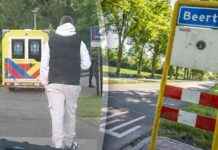In Rome
The Roman summer is always sultry. But today, Rome, which expects to see the thermometer climb to 42 degrees pushed by the African anticyclone Cerberus, an absolute record, will seal against the hot air. Around 3 p.m. yesterday, there were only tourists visible in the streets of the Italian capital. The Romans, on the other hand, were cautiously parked at home behind their closed shutters waiting for a drop in temperatures, leaving a city in slow motion and almost giving the illusion of being emptied of its inhabitants.
Jack and Johanna, in their early forties, come from Yorkshire in the north of England, they are peony red and dripping, clinging to their small, already empty water bottle, and to their umbrella which serves as a parasol. Arrived yesterday for five days, they have just left the visit of the Colosseum, which they had reserved for several weeks, and which unlike the Parthenon in Athens has not been closed. “We expected it to be hot, but not this hot,” Jack said. But anyway this does not change our plans, because all our visits were booked in advance. Fortunately, tomorrow we are going to the Vatican Museum, which will surely be air-conditioned. We’ll probably look more for closed places.”
A couple with two children between five and ten years old, who arrived yesterday from Chile for a week, are resting in the shadow of the Arch of Constantine, near the Colosseum: “We are going to do the main sites that we had reserved, but for the rest we will look for activities made more for children, such as a water park around Rome. In fact, at the Colosseum checkouts, at the foot of the Temple of Venus, we recognize that “if there are still a lot of people, it is because most of the places were taken in advance. But we see that the queues for tickets without reservation are much shorter. The effect of the great heat is already visible. »
An American couple from Ohio, sitting in the shadow of the Capitol in the Roman Forum: “We’re going to do less than originally planned, two visits instead of three or four, because we can’t run from site to site in this heat. Fortunately, after our four days in Rome, we go to Berlin and then to Paris where it is cooler. »
Those who ventured out stalk the shadows of buildings, palisades, even statues. And just to breathe a little, they will gladly sit on the edge of a shaded sidewalk in the pedestrian streets. We approach the large fountains to sprinkle ourselves, without however diving into them. Many came to take refuge in the air-conditioned coolness of Rinascente, the department store in Via del Tritone, which saw an unusual influx for a Monday. To cool off and walk around, a little to buy too. While in recent days, Rome was crushed by massive “overtourism” with a presence never seen before, yesterday between 3 and 4 p.m., the squares and streets of the tourist city were less dense. It was around 7 p.m., when the heat peaks had passed, that the streets were once again filled with a crowd happy to be able to go out again.
The heat wave that is hitting southern Europe and is expected to last all week has reached a level never seen on the peninsula. While Monday, 17 Italian cities were on red alert, they are 20 on Tuesday, and will be 23 on Wednesday. In Rome, the temperature is forecast to be 4 degrees above its 2003 record, with mercury possibly nearing 45 degrees. In Sardinia, highs of 47 degrees are expected in the southern interior areas. In Sicily from 45 to 46 degrees as in Syracuse, Agrigento and Catenanuova. And in Puglia we expect 44 to 45 degrees in Foggia. Temperatures which exceed their 2003 record by 5 degrees, and whose discomfort is aggravated by high humidity which creates a feeling of suffocation. At night in the most urbanized cities, temperatures remain above 30 degrees around midnight. Even the sea reaches exceptional temperatures, at 30 degrees on the surface, “a tropical level of the Libyan Sea”, says a climatologist.
As the emergency rooms fill up, especially with improvident foreign tourists, the authorities are deploying prevention plans so as not to overcrowd them. The Ministry of Health has asked the regions to adopt a “heat plan”, to activate preferential emergency assistance routes, childcare services and to reactivate home assistance units for identified people. at risk, starting with isolated elderly people for whom dehydration can be fatal. In Rome, while 118 received 1,300 emergency calls yesterday, up 15% from the previous day, the alert is at its maximum: today, Civil Protection has planned to mobilize from 11 a.m. on twenty-eight very busy points in the city, the busiest points 80 volunteers, called “the angels of freshness”, recognizable by their multicolored uniform, who will have to identify people at risk of illness, starting with the elderly . And give them the basic advice: “Don’t go out at the hottest hours and stay hydrated”. The map of the city’s 3,500 fountains, so popular for cooling off, is available on the Waidy wow app.
But it’s not just tourists who are suffering. Less visible, the homeless find themselves on the front line of risks: “When the Romans deserted the city for the summer, the homeless were left to fend for themselves, and were crippled by loneliness”, explains the spokesperson for the Community of Sant’Egidio, M Zuccolini, to the ADN Kronos agency, which appealed to the population not to leave people alone during the summer. “The homes of Caritas Rome are full and the waiting list is getting longer and longer,” explains Alberto Colaiacono, from Caritas Rome. In the three canteens, Colle Oppio and Ostia, only for lunch, and Via Marsala, only for dinner, we distribute between 1,500 and 1,700 meals a day. For the homeless, the canteen is not only a meal, it is also the possibility of using the toilets, of washing, of changing clothes, of freshening up, of finding a little freshness relation to heat.
It is especially in stations that the influx of homeless people is greatest because people can find toilets and air conditioning there to cool off a bit. Where they meet tourists who go north in search of a little freshness.




















